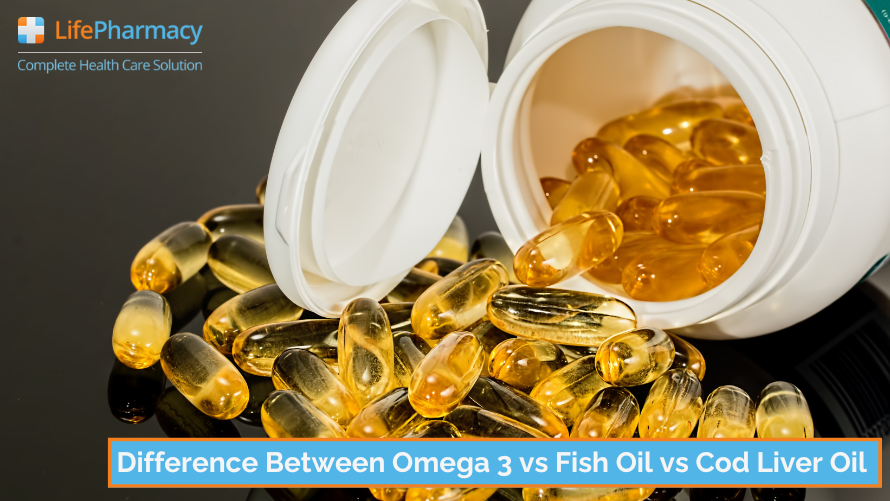Many people wonder whether to incorporate fish oil or cod liver oil into their diets. This guide aims to clear any doubts, especially for those exploring options at a vitamins shop, by explaining the differences between omega 3 vs fish oil, and cod liver oil.
Omega 3 vs Fish Oil vs Cod Liver Oil: All You Need to Know
Omega 3 Essential Fatty Acids
Omega-3 is the name for a group of polyunsaturated fatty acids consisting of three main types: Alpha-linolenic acid (ALA), Eicosapentaenoic acid (EPA), and Docosahexaenoic acid (DHA). While ALA is primarily found in plant sources like flaxseed, walnut, and rapeseed oil, DHA and EPA mainly come from seafood, including fish. Your body can convert a portion of ALA into EPA and DHA, but not efficiently, making direct sources valuable.
DHA and EPA, particularly from fish oil or Omega-3 supplements, are crucial for overall well-being. These fatty acids can be sourced from oily fish or vegetarian options like marine algae. Adults are advised to consume 500 mg of EPA and DHA combined daily, equivalent to around 140g (or two servings) of oily fish per week, such as salmon, mackerel, or sardines. For those not fond of fish, sources like walnuts and flaxseed oil are rich in ALA. Although supplements offer an alternative way to meet these fatty acid needs, they should complement, not replace, a nutritious diet for the full health benefits of omega-3.
Health Benefits of Omega 3
Recommended daily intake of omega 3’s can give the following benefits:
-
DHA is a major component of the retina. It is crucial for maintaining eye health and may help prevent macular degeneration.
-
Essential for brain development, omega-3s are linked to improved cognitive development and lower risks of developmental delays in infants. They may also improve attention, task completion, and hyperactivity in children with ADHD.
-
Omega-3s aid in reducing triglycerides, preventing blood clots, and fighting inflammation, contributing to a heart health.
-
Omega-3s help decrease long-term inflammation, potentially lowering the risk of chronic diseases.
-
Omega-3s may lower the risk of autoimmune diseases and reduce symptoms in conditions like type 1 diabetes and rheumatoid arthritis.
-
Omega-3 supplementation is associated with improved symptoms in psychiatric disorders, such as schizophrenia, depression, anxiety, and bipolar disorder.
-
High omega-3 intake is linked to reduced mental decline and a lower risk of Alzheimer's disease.
-
Consuming omega-3s may reduce the risk of certain cancers, including colon, prostate, and breast cancer.
-
Omega-3 consumption is associated with a decreased risk of asthma, offering relief from chronic lung disease symptoms.
-
Omega-3s may help combat non-alcoholic fatty liver disease by reducing liver fat and inflammation.
-
Supplementing with omega-3s could improve bone strength and alleviate arthritis symptoms, promoting overall skeletal health.
-
Omega-3 fatty acids can reduce the intensity of menstrual pain, boosting feminine health and offering pain relief. Omega 3(DHA) is safe during pregnancy as it contributes to normal fetal brain & eye development.
-
Omega-3 levels are connected to better sleep quality and length, which is essential for overall well-being.
-
Omega-3s, especially EPA, play a significant role in maintaining skin health, preventing premature aging, and protecting against sun damage.
Cod Liver Oil

Cod liver oil is a nutrient-rich supplement derived from the liver of cod fish. It is celebrated for its high levels of EPA and DHA omega-3 fatty acids and essential vitamins A and D. Cod liver oil stands out because it contains vitamins A and D, offering many health benefits, unlike regular fish oil supplements.
Health Benefits of Cod Liver Oil
Cod liver oil not only delivers the well-documented benefits of omega-3 fatty acids but also provides significant amounts of vitamins A and D, enhancing its health-boosting potential.
Benefits of Vitamin A
-
Vitamin A, an important antioxidant in cod liver oil, supports vision, tissue growth, and repair. The retinol form of vitamin A is crucial for maintaining eye health and producing rhodopsin, a pigment essential for vision in low light. High omega-3 intake can lower the risk of vision loss from age-related macular degeneration.
Benefits of Vitamin D
-
Cod liver oil is an excellent source of vitamin D3, essential for absorbing calcium and phosphate, promoting bone strength. Adequate vitamin D intake is critical in preventing rickets in children and osteomalacia and osteoporosis in adults. It has been noted that women who took cod liver oil supplements had a significantly lower risk of vitamin D deficiency than those who did not.
-
Additionally, vitamin D plays a role in immune function and brain health, potentially working alongside omega-3 to regulate serotonin levels, known as the 'happy' neurotransmitter, in the brain. Vitamin D also plays a crucial role during pregnancy.
Fish Oil
Fish oil is derived from the tissue of fatty fish, such as mackerel, sardines, salmon, herring, and tuna. It's rich in omega-3 fatty acids, making it a valuable dietary source of DHA and EPA, key for numerous health benefits.
Health Benefits of Fish Oil
With 30% of its content being pure omega-3 fatty acids, fish oil plays a crucial role in supporting various aspects of health:
-
It contributes significantly to heart health and mental well-being.
-
Fish oil can reduce inflammation and alleviate pain, particularly in conditions like rheumatoid arthritis.
-
It supports healthy pregnancy, fetal development, and breastfeeding.
-
Fish oil aids in healthy brain development and function and may help in preventing mental health disorders and managing conditions such as schizophrenia and bipolar disorder.
-
It also has the potential to decrease waist circumference, promote skin health, and support liver health.
Difference Between Omega-3, Fish Oils, and Cod Liver Oil

Cod liver oil and omega-3 fatty acids are different. While cod liver oil and fish oil are valuable sources of omega-3 fatty acids, they differ in their origins and nutritional profiles. Cod liver oil is derived from the liver of cod fish, whereas fish oil is obtained from the tissue of various fatty fish, including salmon, sardines, tuna, and mackerel. A significant difference is that cod liver oil also contains vitamins A and D, which are not present in typical omega-3 oils.
Cod liver oil has lower omega-3 levels and is less fatty compared to other fish oils. However, it can be harmful in large amounts, especially for pregnant or breastfeeding women. Beyond omega-3 benefits, cod liver oil has traditionally been used for various health purposes, including easing constipation and as a folk remedy for inducing labor.
Both supplements are valued for their omega-3 content, providing crucial fatty acids that the body cannot produce independently. The choice between fish oil types depends on individual health needs and dietary preferences.
Choosing Your Oils Wisely
Selecting the right oil supplement depends on dietary habits and specific health goals. You can choose from:
-
Cod Liver Oil: Ideal for those seeking extra vitamins A and D, it typically contains about 560 mg DHA and 370 mg EPA per dose, with added natural preservatives.
-
Fish Oil: Sourced from the flesh of oily fish, it offers around 240 mg DHA and 360 mg EPA per capsule, often with added vitamin E.
-
Krill Oil: Provides omega-3s with antioxidant pigments like astaxanthin, usually in smaller doses than fish oil but with added flavorings.
-
Algae Oil: A plant-based source of EPA and DHA, suitable for those seeking marine-sourced omega-3 without consuming fish.
For those who prefer not to swallow capsules, alternatives like chewable jellies and flavored liquid oils are available. Some cod liver oils even win taste awards for their pleasant flavors.
Considerations and Recommendations
Either cod liver oil or fish oil supplements can be effective for omega-3 intake. It's not necessary to take both. Pharmacy Online has a range of products for all your health needs. We have a complete range of omega-3, fish oil, and cod liver oil products from renowned brands.
Online pharmacists urge you to consult a healthcare provider before starting any supplement, especially if you are on medication or if you are allergic to fish. Pregnant women should avoid cod liver oil due to its high vitamin A content.
Due to the wide availability of these vitamins and supplements online, it is important to prioritize quality to ensure safety and efficacy. It is also important to store them correctly to maintain their freshness.
When it comes to fish oil supplements, the content and type of omega-3 fatty acids can vary significantly, so it's crucial to read the labels carefully. Additionally, pay attention to other ingredients in the cod liver oil supplements to avoid the risk of vitamin overdose.
Ready to boost your health with the right vitamin source?
Life Pharmacy UK has a huge product range to meet your needs.
Unlock the Power of Omega-3, Fish Oils, and Cod Liver Oil With Life Pharmacy
Both fish oil and cod liver oil are valuable sources for increasing your intake of omega-3 fatty acids, which are essential for overall health and well-being. While they share many benefits, the choice between them depends on their sources and nutritional content. To reap the full health benefits of omega-3, incorporating fatty fish into your diet is highly recommended.
Order your supplements from Life Pharmacy UK now!






